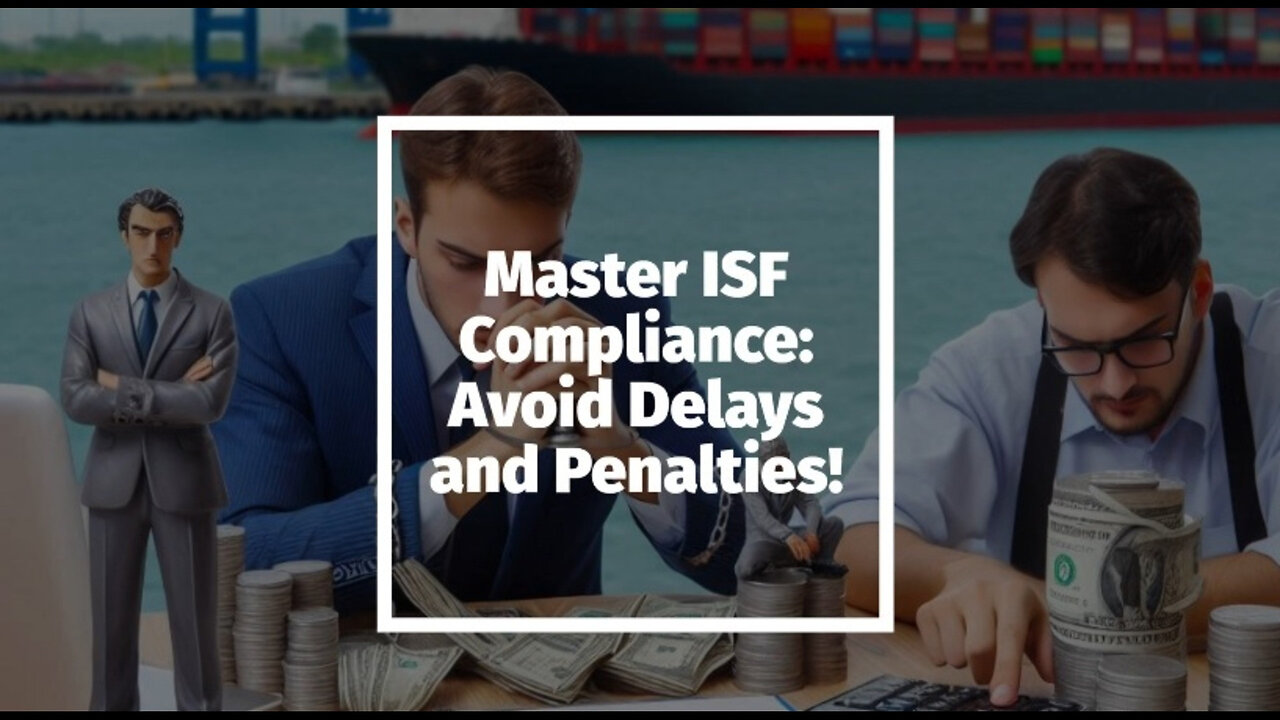Premium Only Content

Mastering ISF Compliance: Avoid Penalties and Delays in International Trade
License To Import // 323-578-6432 // file@licensetoimport.com // www.licensetoimport.com
This response highlights the significance of timely Importer Security Filing (ISF) compliance in the customs brokerage process. The Importer Security Filing, also known as the ISF, must be filed at least 24 hours before the cargo is loaded onto a vessel bound for the US. The accurate and timely submission of the ISF ensures that cargo meets the security standards set by US Customs and Border Protection. Compliance with ISF regulations is essential for avoiding penalties, such as fines, cargo holds, and seizure of goods. Timely ISF compliance allows customs authorities to assess the security risk associated with each shipment beforehand and take necessary measures. Non-compliance can lead to delays and disruptions in the supply chain, affecting production schedules and increasing costs. Working with a licensed customs broker can assist in ensuring timely compliance and navigating the complexities of customs regulations. Non-compliance with ISF regulations can incur significant financial penalties, emphasizing the importance of prioritizing compliance. Overall, timely ISF compliance is vital for maintaining security, avoiding penalties, and ensuring a smooth and efficient customs clearance process.
#usimportbond #isfcustomsbroker #uscustomsclearing #isfentry
Video Disclaimer Here: This video is solely for education and is not endorsed by any US government agency.
00:29 - Timely Importer Security Filing (ISF) compliance is crucial to avoid penalties and delays in the customs clearance process.
00:52 - Failure to comply with ISF requirements can result in fines, cargo holds, and even seizure of goods.
1:17 - Timely ISF compliance allows customs authorities to assess security risks and ensures smooth flow of goods through customs.
2:13 - Working with a licensed customs broker can help ensure accurate and timely ISF filings, minimizing the risk of supply chain disruptions and costly penalties.
-
 LIVE
LIVE
Dr Disrespect
2 hours ago🔴LIVE - DR DISRESPECT - DELTA FORCE - INTENSE SITUATIONS ONLY!
4,803 watching -
 LIVE
LIVE
Winston Marshall
5 hours agoBritain’s R*PE GANGS: How and Why The Media Failed - Patrick Christys
170 watching -
 LIVE
LIVE
Professor Nez
1 hour ago🚨BREAKING: Trump SLAMS Sentencing to Judge Merchan's FACE in New York Hush Money Case
160 watching -
 LIVE
LIVE
Barstool Yak
2 hours agoThe Yak with Big Cat & Co. Presented by Rhoback | The Yak 1-10-25
150 watching -
 LIVE
LIVE
The Charlie Kirk Show
1 hour agoThe Lawfare Ends + CA Fire Updates + TikTok's Future| Darvish, Sen. Schmitt, Brown | 1.10.2025
9,907 watching -
 1:03:33
1:03:33
The Dan Bongino Show
3 hours agoDisturbing News On The Lawfare Op Against Trump (Ep. 2398) - 01/10/2025
444K1.64K -
 50:45
50:45
The Rubin Report
20 hours agoBill Maher Shocks Stephen A. Smith with What Liberals Tell Him Behind Closed Doors
28.6K21 -
 LIVE
LIVE
Film Threat
2 hours agoJANUARY CRAP CONTINUES! | Film Threat Livecast
199 watching -
 33:42
33:42
Tudor Dixon
3 hours agoWho's to Blame for the California Wildfires? | The Tudor Dixon Podcast
2.47K -
 LIVE
LIVE
The Big Mig™
18 hours agoGlobal Finance Forum Powered By Genesis Gold Group
2,230 watching